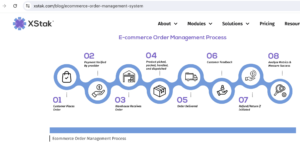For most businesses, both B2C and B2B, commerce has expanded into the dynamically evolving virtual space. Online stores continue to innovate, driven by the ever-increasing expectations of shoppers. Companies that want to remain attractive to current and potential Customers must respond to their needs by modifying their sales platforms. At Hicron, the e-commerce team supports Clients in integrating SAP environments with sales platforms to achieve their optimal development as well as ensure the satisfaction of entrepreneurs and successful implementation of business strategies.
How does SAP support e-commerce?
Online sales are at the peak of their innovation, and all indications are that they will stay there for a long time. This is one of the market areas that involves the most advanced strategies and technologies. As a result, it is a huge challenge for entrepreneurs. Creating a modern, but most of all attractive and reliable e-commerce site is a process that requires not only proper preparation, but also proper maintenance.
SAP integration with e-commerce – a perfect fit
As an ERP system, SAP can be integrated with virtually any e-commerce platform. The most popular solutions in this area, managed by Hicron experts in the E-Commerce Solutions Consulting and SAP Technology teams, are: Adobe Commerce (Magento), Salesforce, Sitecore, SAP Commerce Cloud (Hybris), as well as individual e-commerce solutions of our Clients. Not all of these sites were developed by SAP, but their integration with this ERP is not a challenge for our team of specialists.
The primary goal of integrating an SAP system with sales platforms is to automate processes to ensure efficient order processing. From the point of view of online store Customers, the following are important:
- Receiving information about the availability and price of the desired product immediately after opening the product page.
- Efficient and secure payment processing.
- Fast delivery of the ordered product to the Customer.
Effective integration with an SAP system makes it possible to provide up-to-date information on product availability and pricing. In addition, information about the order placed is sent to the SAP system in near real time, so that the order fulfillment process can begin immediately. This shortens delivery times, which is an important factor in customer satisfaction and competitive differentiation.
Going back to point 1 above, integration with SAP ensures that inventory levels are updated in “real time”, so product availability information is always up to date.

(source: xstak.com/ecommerce-order-management-system)
Successful implementation of such an undertaking is possible with the use of an appropriate strategy. As with any integration, combining SAP with e-commerce requires careful planning of all activities.
The following diagram can serve as a starting point
Conducting a system requirements analysis:
- defining the data and business processes required for integration between SAP and the e-commerce platform,
- specifying the type of integration (two-way or one-way).
Specifying the integration method:
- selecting the method of integration between appropriate extensions, API, or middleware.
Configuring and mapping data:
- carrying out appropriate configuration of settings in SAP systems and the e-commerce platform,
- defining data mapping, which is intended to ensure information compliance and consistency across system environments.
Integrating finances:
- integrating all data related to finances, orders and payments, allowing you to avoid double entry of information.
Monitoring resources:
- synchronizing data related to inventory levels in real time and monitoring them between SAP and e-commerce.
Integrating Customer data and orders:
- standardized monitoring of orders and customers between SAP and e-commerce.
Monitoring and testing:
- conducting ongoing integration monitoring to identify and locate potential complications,
- conducting regular testing to ensure that data is properly transferred and interpreted between system environments.
SAP functionalities for online stores
SAP’s unique advantage in integrating with e-commerce platforms is its versatility. Such a connection makes it possible to maintain all the functionality of the sales platform and even supports companies in their development. Merging these two environments provides online stores with an expanded ability to tailor the sales offer to the individual preferences of buyers. It is worth noting that the integration is not only for sites aimed at individual consumers (B2C), but also for business Clients (B2B). The solution helps businesses to conduct transactions in a convenient and secure environment, but most importantly, it increases satisfaction and comfort for both buyers and sellers.
It is therefore worth taking a look at the functionality that e-commerce platforms gain through integration with SAP ERP:
- inventory monitoring – allows you to track and optimize inventory levels in real time to avoid shortages and overstocking;
- integration with financial systems and extensions – enables integration of these areas of e-commerce activity for improved cost control, reporting, and invoicing;
- order tracking – enables the management of order processes from submission to completion and synchronization with various sales channels, such as marketplaces;
- customer service – supports Customer service at the highest level; provides the company with a centralized database of buyers that collects information about their order history, preferences, and interactions with the company; also offers customer service automation, enabling fast and effective support and increased satisfaction;
- integration with other sales channels – enables synchronization not only with e-commerce platforms, but also with other sales channels, which helps companies organize incoming orders and maintain constant control over, for example, inventory levels;
- analytics and reporting – provides advanced tools for analyzing and implementing effective business strategies; allows you to create personalized reports;
- product management – provides the ability to fully track products throughout their lifecycle, categorize them, and maintain an up-to-date catalog;
- monitoring of Customer retention – improves the company’s activities aimed at building long-term Customer relationships and loyalty, as well as increasing their number; provides tools to maintain the interest of buyers, such as individualization of offers and loyalty programs,
- monitoring of promotions and discounts – helps plan and maintain strategies related to promotional campaigns and automates these activities.

E-commerce integration with SAP – choose secure support!
Proper integration of SAP with your existing e-commerce infrastructure is the key to success. It requires oversight not only by the organization’s managers themselves, but also by experienced experts in implementing such systems. The right partner will help the organization go through this process with peace of mind and respect for the values and business processes it has developed. It pays to choose an SAP partner that operates according to proven, professional, and secure practices of the producer. This allows the implementation to take place in a much shorter time, on the Client’s terms, and most importantly – without complications.

Convenient and personalized implementation with Hicron
As an SAP partner, Hicron offers comprehensive implementation services for the vendor’s ERP systems. Our years of experience allow us to meet the expectations of different organizations. We know and understand the business needs of our Clients very well, which leads to excellent results in the form of modern and functional systems tailored to the individual needs of their users. We have also successfully implemented many e-commerce solutions. Our effectiveness in this area is proven by the title of Adobe Partner in the field of Adobe Commerce (Magento). Looking for a trusted implementation partner? Have questions about connecting SAP to your virtual sales site? Contact our e-commerce experts!





